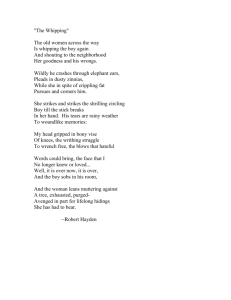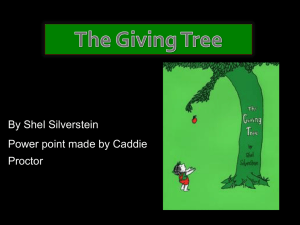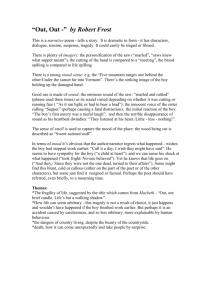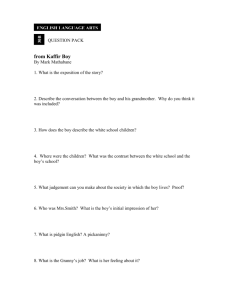Mentor Texts Exemplars from Writing
advertisement
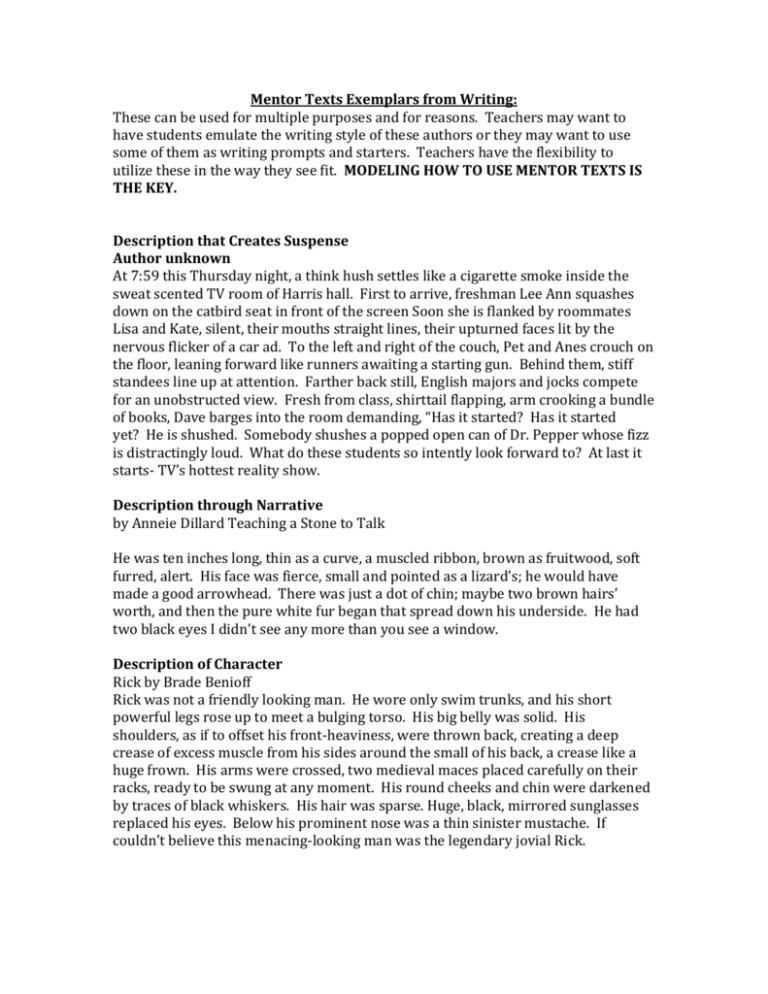
Mentor Texts Exemplars from Writing: These can be used for multiple purposes and for reasons. Teachers may want to have students emulate the writing style of these authors or they may want to use some of them as writing prompts and starters. Teachers have the flexibility to utilize these in the way they see fit. MODELING HOW TO USE MENTOR TEXTS IS THE KEY. Description that Creates Suspense Author unknown At 7:59 this Thursday night, a think hush settles like a cigarette smoke inside the sweat scented TV room of Harris hall. First to arrive, freshman Lee Ann squashes down on the catbird seat in front of the screen Soon she is flanked by roommates Lisa and Kate, silent, their mouths straight lines, their upturned faces lit by the nervous flicker of a car ad. To the left and right of the couch, Pet and Anes crouch on the floor, leaning forward like runners awaiting a starting gun. Behind them, stiff standees line up at attention. Farther back still, English majors and jocks compete for an unobstructed view. Fresh from class, shirttail flapping, arm crooking a bundle of books, Dave barges into the room demanding, “Has it started? Has it started yet? He is shushed. Somebody shushes a popped open can of Dr. Pepper whose fizz is distractingly loud. What do these students so intently look forward to? At last it starts- TV’s hottest reality show. Description through Narrative by Anneie Dillard Teaching a Stone to Talk He was ten inches long, thin as a curve, a muscled ribbon, brown as fruitwood, soft furred, alert. His face was fierce, small and pointed as a lizard’s; he would have made a good arrowhead. There was just a dot of chin; maybe two brown hairs’ worth, and then the pure white fur began that spread down his underside. He had two black eyes I didn’t see any more than you see a window. Description of Character Rick by Brade Benioff Rick was not a friendly looking man. He wore only swim trunks, and his short powerful legs rose up to meet a bulging torso. His big belly was solid. His shoulders, as if to offset his front-heaviness, were thrown back, creating a deep crease of excess muscle from his sides around the small of his back, a crease like a huge frown. His arms were crossed, two medieval maces placed carefully on their racks, ready to be swung at any moment. His round cheeks and chin were darkened by traces of black whiskers. His hair was sparse. Huge, black, mirrored sunglasses replaced his eyes. Below his prominent nose was a thin sinister mustache. If couldn’t believe this menacing-looking man was the legendary jovial Rick. Dialogue through Narrative (actual dialogue and summarized dialogue) Gary Soto Living up the street “Are you tired?” she asked. “No, but I got a sliver from the frame,” I told her. I showed her the web of skin between my thumb and index finger. She wrinkled her forehead but said it was nothing. “How many trays did you do?” I looked straight ahead, not answering at first. I recounted in my mind the whole morning of bend, cut, pour again and again. Before answering in my mind the “thirty-seven.” No elaboration, no detail. Without looking at me she told me how she had done fieldwork in Texas and Michigan as a child. But I had a difficult time listening to her stories. I played with my grape knife, stabbing it into the ground, but stopped when Mother reminded me I better not lose it. I left the knife sticking up like a small leafless plant. She then talked about school, the junior high I would be going to that fall, and then about Rick and Debra, how sorry they would be they hadn’t come to pick grapes because they’d have no new clothes for the school year. Describing through Sight Amy Tan Fish Cheeks On Christmas Eve I saw that my mother had outdone herself in creating a strange menu. She was pulling black veins out of the backs of fleshy prawns. The kitchen was littered with appalling mounds of raw food. A slimy cod with bulging eyes that pleaded not to be thrown into a pan of hot oil. Tofu, which looked like stacked wedges of rubbery sponges. A bowl soaking dried fungus back to life. A plate of squid, their backs crisscrossed with knife markings so they resembled bicycle tires. Tracy Kidder Among School Children She was thirty-four. She wore a white skirt and yellow sweater and a thin gold necklace, which she held in her fingers as if holding her own reins, while waiting for children to answer. Her hair was black with a hint of Irish red. It was cut short to the tops of her ears, and swept back like a pair of folded wings. She had a delicate cleft chin and was short-the children’s chairs would have fit her.... Her hands kept very busy. Thy sliced the air and made karate chops to mark off boundaries. The extended straight out like a traffic cop’s, halting illegal maneuvers yet to be perpetrated. When they rested momentarily on her hips, her hands looked as if they were in holsters. Describing through Hearing Ian Frazier Canal Street The traffic on Canal Street never stops. It is high energy current jumping constantly between the poles of Brooklyn and New Jersey. It hates to have its flow pinched in the destiny of Manhattan, hates to stop at intersections. Along Canal Street, it moans and screams. Worn brake shoes of semi trucks go “Ohhhhhhhhhnnnnnooooooooh” at stoplights, and the sound echoes in the canyons of warehouses and Chinatown tenements. People lean o their horns from one end of Canal Street to the other. They’ll honk nonstop for ten minutes at a time, until the horns get tired and out of breath. They’ll try different combinations: shave and a haircut, long-longlong, short, short short, long. Some people have musical car horns of four tunes. Descriptive Writing for Setting John Steinbeck Of Mice and Men A few miles south of Soledad, the Salinas River drops in close to the hillside bank and runs deep and green. The water is warm too, for it has slipped twinkling over the yellow sands in the sunlight before reaching the narrow pool. On one side of the river the golden foothill slopes curve up to the strong and rocky Gabilan Mountains, but on the valley side the water is lined with trees— willows fresh and green with every spring, carrying in their lower leaf junctures the debris of the winter’s flooding; and sycamores with mottled, white, recumbent limbs and branches that arch over the pool. On the sandy bank under the trees the leaves lie deep and so crisp that a lizard makes a great skittering if he runs among them. Rabbits come out of the brush to sit on the sand in the evening, and the damp flats are covered with the night tracks of ‘coons, and with the spread pads of dogs from the ranches, and with the split-wedge tracks of deer that come to drink in the dark. Use of Dialect in Narrative Writing Zora Neale Hurston Their Eyes Were Watching God “Ah ain’t never seen my papa. And Ah didn’t know ‘im if Ah did. Mah mamma neither. She was gone from round dere long before Ah wuz big enough tuh know. Mah grandma raised me. Mah grandma and de white folks she worked wid. She had a house out in de backyard and dat’s where Ah wuz born. They was quality white folks up dere in West Florida. Named Washburn. She had four gran’chillun on de place and all of us played together and dat’s how come Ah never called mah grandma nothin’ but Nanny, ‘cause dat’s what everybody on de place called her. Nanny used to ketch us in our devilment and lick every youngun on de place and Mis’ Washburn did de same. Ah reckon dey never hit us uh lick amiss ‘cause dem three boys and us two girls wuz pretty aggravatin’, Ah speck. Paragraphs from Memoirs Nathan McCall Makes me Wanna Holla The fellas and I were hanging our on our corner one afternoon when the strangest thing happened. A white boy, who appeared to be about eighteen or nineteen years old, came pedaling a bicycle casually through the neighborhood. I don’t know if he was lost or just confused, but he was definitely in the wrong place to be doing the tourist bit. Somebody spotted him and pointed him out to the rest of us. “Look!” What’s that mother**** doin ridin’ through here! Is he craaaaaazzy?! Author Unknown Go Ask Alice Yesterday I remember thinking I was the happiest person in the whole galaxy, in all God’s creation. Could that only have been yesterday or was it endless light years ago? I was thinking the grass had never smelled grassier, the sky had never seemed so high. Now it’s all smashed down upon my head and I wish I could just melt into the blaaa-ness of the universe and cease to exist. Oh why, why, why can’t I? How can I face Sharon and Debbie and the rest of the kids? How can I? By now the word has gotten around the whole school, I know it has. Piri Thomas Down These Mean Streets Yee-ah!! Wanna know how many times I’ve stood on the rooftop and yelled out to anybody; “Hey, World-here I am. Hallo, World- this is Piri. That’s me. “I wanna tell ya I’m here, and I want recognition, whatever that mudder***** means.” Man how many times have I stood on that rooftop of my broken down building at night and watched the bulb-lit world below. Like somehow it’s different at night, this is my Harlem. There ain’t no bright sunlight to reveal the stark naked truth of garbage littered streets. Gone is the drabness and hurt, covered by a friendly night. It makes clean the dirty-faced kids. Alex Kotlowitz There are No Chidren Here Nine year 0ld Pharoah Rivers, stumbled to his knees. “Give me your hand,” ordered his older brother, Lafeyette, who was almost twelve. “Give me your hand.” Pharoah reached upward and grabbed slippery, narrow trail of dirt and brush. “C’mon, man.” Lafeyette urged, as his stick thin body whirled around with a sense of urgency. “Let’s go.” He paused to watch Pharoah struggle through a thicket of vines. “Man you slow.” He had little patience for the smaller boy’s clumsiness. Their friends had already reached the top of the railroad pass. Dave Peltzer The Lost Boy Winter 1970, Daly City, California I’m hungry and I’m shivering in the dark. I sit on top of my hands at the bottom of the stairs in the garage. My head is tilted backward. My hands became numb hours ago. My neck and shoulder muscles begin to throb. But that’s nothing new-I’ve learned to turn off the pain. I’m mother’s prisoner. I am nine years old, and I’ve been living like this for years. Every day it’s the same thing. I wake up from sleeping on an old army cot in the garage, perform chores, and if I’m lucky, eat leftover breakfast cereal from my brothers. I run to school, steal food, return t “The House” and am forced to throw up in the toilet bowl to prove that I didn’t commit the crime of stealing any food. John Niedhart Black Elk Speaks My Friend, I am going to tell you the story of my life, as you wish; and if it were only the story of my life I think I would not tell it; for what is one man that he should make much of his winters, even when they bend him like a heavy snow? So many other men have lived and shall live that story, to be grass upon the hills. In the story of all life that is holy and is good to tell, and of us two-leggeds sharing it with the four-leggeds and the wings of the air and all green things; for these are children of one mother and their father is on Spirit. This then, is not the tale of a great hunter or of a great warrior, or of a great traveler, although I have made much meat in my time and fought for my people both as a boy and a man, and have gone far and seen strange lands and men. So also have many others done, and better than I. These things I shall remember by the way, and often they may seem to be the very tale itself, as when I was living them in happiness and sorrow. But now that I can see it all as from a lonely hilltop, I know it was the story of a mighty vision given to a man too weak to use it; of a holy tree that should have flourished in a people’s heart with flowers and singing birds, and now is withered; and of a people’s dream that died in bloody snow. Narrative Writing that uses Language to create Mood John Spargo The Bitter Cry of the Children Work in the coal breakers is exceedingly hard and dangerous. Crouched over the chutes, the boys sit hour after hour, picking out the pieces of slate and other refuse from the coal as it rushes past to the washers. From the cramped position they have to assume, most of them become more or less deformed and bent-backed like old men… The coal is hard, and accidents to the hands, such as cut, broken, or crushed fingers, are common among the boys. Sometimes there is a worse accident: a terrified shriek is heard, and a boy is mangled and torn in the machinery, or disappears in the chute to be picked out later smothered and dead. Clouds of dust fill the breakers and are inhaled by the boys, laying the foundations for asthma and miners’ consumption. I once stood in a breaker for half an hour and tried to do the work a twelve year old boy was doing day after day, for ten hours at a stretch, for sixty cents a day. The gloom of the breaker appalled me. Outside the sun shone brightly, the air was (clear), and the birds sang in chorus with the trees and the rivers. Within the breaker there was blackness, clouds of deadly dust enfolded everything, the harsh, grinding roar of the machinery and the ceaseless rushing of coal through the chutes filled the ears. I tried to pick out the pieces of slate from the hurrying stream of coal, often missing them; my hands were bruised and cut in a few minutes; I was covered from head to foot with coal dust… Dr. Sampson Davis, George Jenkins , and Rameck Hunt The Pact WE TREAT THEM in our hospitals every day. They are young brothers, often drug dealers, gang members, or small time criminals, who show up shot, stabbed, or beaten after a hustle gone bad. To some of medical colleagues, they are just nameless thugs, perpetuating crime and death in neighborhoods that have seen far too much of those things. But when we look into their faces, we see ourselves as teenagers, we see our friends, we see what easily could have become as young adults. And we’re reminded of the thin line that separates us- three twenty nine year old doctors (an emergency room physician, an internist, and a dentist) from these patients whose lives are filled with danger and desperation. Each of us experienced friendships that could have destroyed our lives. We suspect that many of the young brothers we treat everyday in our hospitals are entangled in such friendships-friendships that require them to prove their toughness and manhood daily, even at the risk of losing their own lives. The three of us were blessed. We found in one another a friendship that works in a powerful way; a friendship that helped three vulnerable boys grow into successful men; a friendship that ultimately saved our lives. As soon as my mother, my brother, and I moved to the projects in a building on Muhammad Ali Avenue, my mom started working to get us out. She was a proud woman, and she didn’t like living in public housing. She wanted to make it on her own. Raised on a farm with eight brothers and sisters in Warrenton, South Carolina, she had been taught to fend for herself. She developed a toughness that at times made her emotionless, but her determination and consistency stabilized our lives. I never saw life break her down. If she struggled to pay the bills-and I know there must have been times when she did-her children never saw it. When Garland and I did well, she praised us without gushing. And we knew better than to expect a reward for doing what we were expected to do, like cleaning our room or making a good grade on a report card. Luis Rodriguez Always Running Late winter in Chicago, early 1991: The once-white snow, which fell in December, had turned into a dark scum, mixed with ice-melting salt, car oil and decay. Icicles hung from rooftops and windowsills like the whiskers of old men. For months, the bone chilling “hawk” swooped down and forced everyone in the family to squeeze in a one-and-a-half bedroom apartment in a gray-stone, three flat building in the Humboldt Park neighborhood. Inside tensions built up like fever as we crammed around the TV set or kitchen table, the crowding made more intolerable because of heaps of papers, opened file drawers and shelves packed with books that garnered every section of empty space (a sort of writer’s torture chamber.) Richard Wright Block Boy One winter morning in the long’ go, four year old days of my life I found myself standing before a fireplace, warming my hands over a mound of glowing coals, listening to the wind whistle past the house outside. All morning my mother had been scolding me, telling me to keep still, warning me that I must make no noise. And I was angry, fretful, and impatient. In the next room Granny lay ill and under the day and night care of a doctor and I knew that I would be punished if I did not obey. I’m still haunted by dreams of the time we lived on Mr. Carter’s plantation. Lots of Negroes lived on his place. Like Mama and Daddy they were all farmers. We all lived in rotten wood two-room shacks. But ours stood out from others because it was up on the hill with Mr. Carter’s big white house, overlooking the farms and the other shacks below. It looked just like the Carter’s barn with a chimney and a porch, but Mama and Daddy did what they could to make it livable. Since we had only one big room. It was like three rooms in one. The Dialogue Lead: A Mango-Shaped Space By: Wendy Mass: “A is for Amy who fell down the stairs,” says my best friend, Jenna Davis, as we climb farther down into the steep, parched ravine. We’ve been inseparable since we were five and her mother brought her to my house to play. We bonded over the various ways we could contort my Barbie and Ken dolls without breaking them. Let’s just say that Ken won’t be having children anytime soon and leave it at that. Ida B. By: Katherine Hannigan “Ida B,” Mama said to me on one of those days that start right and just keep heading toward perfect until you go to sleep, “when you’re done with the dishes, you can go play. Daddy and I are going to be working till dinner.” Gathering Blue By: Lois Lowry “Mother?” There was no reply. She hadn’t expected one. Her mother had been dead now for four days, and Kira could tell that the last of the spirit was drifting away. Love, Ruby Lavender By: Deborah Wiles “Murderers! You can’t have them all!” Ruby Lavender leaned out the car window and shook her fist. The car lurched to a halt in the dirt yard of Peterson’s Egg Ranch, and Ruby scrambled out the door. She ran in bare feet as fast as she could into a dusty sea of chickens—a sea of chickens being herded toward their death at the chopping block The Action Lead: Igraine the Brave By: Cornelia Funke Igraine woke up because something was crawling over her face. Something with a lot of legs. She opened her eyes and there it was, sitting right on the end of her nose, a fat black spider. Igraine was scared stiff of spiders. Milkweed By: Jerry Spinelli I am running. That’s the first thing I remember. Running. I carry something, my arm curled around it, hugging it to my chest. Bread, of course. Someone is chasing me. “Stop! Thief!” I run. People. Shoulders. Shoes. “Stop! Thief!” When Zachary Beaver Came to Town By: Kimberly Willis Holt Nothing ever happens in Antler, Texas. Nothing much at all. Until this afternoon, when an old blue Thunderbird pulls a trailer decorated with Christmas lights into the Dairy Maid parking lot. The red words painted on the trailer cause quite a buzz around town, and before an hour is up, half of Antler is standing in line with two dollars clutched in hand to see the fattest boy in the world. The Last Treasure By: Janet S. Anderson It is night, just after midnight on June 8. Somewhere in the Midwest on a rickety bed in a cheap motel, a boy who never dreams is dreaming. His dream is crazy, and he thrashes restlessly, trying even in his sleep to shake it into sense. Miles away, almost half the country away, in a tract house in a California town, a girl who dreams too often is sinking into nightmare. She’s had other nightmares, but this one is different. This one is worse. The Thought Lead: So B. It By: Sarah Weeks If truth was a crayon and it was up to me to put a wrapper around it and name its color, I know just what I would call it—dinosaur skin. I used to think, without really thinking about it, that I knew what color was. But that was a long time ago, before I knew what I know now about both dinosaur skin and the truth. California Blue By: David Klaas I don’t know why running through a redwood forest has always made me think of death. It’s not because I grew up in a mill town—I don’t run between the trees seeing fivehundred-foot-tall piles of sawdust or neatly stacked lumber or endless reams of paper. And it’s not because of the darkness where the old growth is thickest, although as I pounded along the narrow forest trail, the massive trees pressed in against each other in the twilight, and the smell of the wood and leaves was damp and lightly sweet and faintly bloodlike. The Name of this Book is Secret By: Pseudonymous Bosch WARNING: DO NOT READ BEYOND THIS PAGE! Good. Now I know I can trust you. You’re curious. You’re brave. And you’re not afraid to lead a life of crime. But let’s get something straight: if, despite my warning, you insist on reading this book, you can’t hold me responsible for the consequences The Descriptive Lead: The Last Treasure By: Janet S. Anderson It is night, just after midnight on June 8. Somewhere in the Midwest on a rickety bed in a cheap motel, a boy who never dreams is dreaming. His dream is crazy, and he thrashes restlessly, trying even in sleep to shake it into sense. Miles away, almost half the country away, in a tract house in a California town, a girl who dreams too often is sinking into nightmare. She’s had other nightmares, but this one is different. This one is worse. Harry Potter and the Sorcerer’s Stone By: J.K.Rowling Mr. and Mrs. Dursley, of number four, Privet Drive, were proud to say that they were perfectly normal, thank you very much. They were the last people you’d expect to be involved in anything strange or mysterious, because they just didn’t hold with such nonsense. Iqbal By Francesco D’Adamo (Translated by: Ann Leonori) The house of our master, Hussain Khan, was in the outskirts of Lahore, not far from the dusty, dry countryside where flocks of sheep from the north grazed. It was a big house… Atherton: House of Power By: Patrick Carman In Mr. Ratikan’s grove there lived a boy. He was not well-to-do, but his needs were met and he was happy most of the time. His name was Edgar. The Problem Question Lead James and the Giant Peach By: Roald Dahl Until he was four years old, James Henry Trotter had had a happy life. He lived peacefully with his mother and father in a beautiful house beside the sea. There were always plenty of other children for him to play with, and there was the sandy beach for him to run about on, and the ocean to paddle in. It was the perfect life for a small boy. The Hunger Games By: Suzanne Collins When I wake up, the other side of the bed is cold. My fingers stretch out, seeking Prim’s warmth but finding only the rough canvas cover of the mattress. She must have had bad dreams and climbed in with our mother. Of course, she did. This is the day of the reaping. Things Not Seen By Andrew Clements It’s a Tuesday morning in February, and I get up as usual, and I stumble into the bathroom to take a shower in the dark. Which is my school-day method because it’s sort of like an extra ten minutes of sleep. It’s after the shower. That’s when it happens. It’s when I turn on the bathroom light and wipe the fog off the mirror to comb my hair. It’s what I see in the mirror. It’s what I don’t see. I took a second time, and then rub at the mirror again. I’m not there. That’s what I’m saying. I’m. Not. There. The Wednesday Wars By: Gary D. Schmidt Of all the kids in the seventh grade at Camillo Junior High, there was one kid that Mrs. Baker hated with heat whiter than the sun. Me. And let me tell you, it wasn’t for anything I’d done. Boys are Dogs By: Leslie Margolis Summer was officially over. There would be no more swimming, snorkeling, or bodysurfing in the cool blue waves. No more relay races, and no more circling the campfire to sing songs and toast marshmallows. The Narrative Lead: Every Soul a Star By: Wendy Mass In Iceland, fairies live inside of rocks. Seriously. They have houses in there and schools and amusement parks and everything. Besides me, not many people outside of Iceland know this. But you just have to read the right books and it’s all there. When you’re homeschooled, you have a lot of books. I also know how to find every constellation in the sky, and that the brightest star in any constellation is called the Alpha. I know all the constellations because my father taught them to me, and I know about the Alpha because it is also my name. But my family and friends call me Ally. Belle Prater’s Boy By: Ruth White Around 5:00 a.m. on a warm Sunday morning in October 1953, my Aunt Belle left her bed and vanished from the face of the earth. Al Capone Does My Shirts By: Gennifer Choldenko Today I moved to a twelve-acre rock covered with cement, topped with bird turd and surrounded by water. Alcatraz sits smack in the middle of the bay—so close to the city of San Francisco, I can hear them call the score on a baseball game on Marina Green. Okay, not that close. But still. Chasing Vermeer By: Blue Balliett On a warm October night in Chicago, three deliveries were made in the same neighborhood. A plump tangerine moon had just risen over Lake Michigan. The doorbell had been rung at each place, and an envelope left propped outside. The Changeling By: Zilpha Keatley Snyder Martha Abbott woke up on the seventh day of April and sat straight up in bed with her eyes wide open. That in itself, was significant. As long as she could remember she had always awakened slowly and cautiously, testing yesterday gingerly with the tip of memory, before taking the plunge into cold bright consciousness. But on that April morning she had no choice. Something had reached deep into her dream and jolted her awake—and then quickly faded, leaving behind only four definite words. Something’s going to happen The Flat Statement Lead: The Teacher’s Funeral: A Comedy in Three Parts By: Richard Peck If your teacher has to die; August isn’t a bad time of year for it. You know August. The corn is earring. The tomatoes are ripening on the vine. The clovers in full bloom. There’s a little less evening now, and that’s a warning. You want to live every day twice over because you’ll be back in the jailhouse of school before the end of the month.



